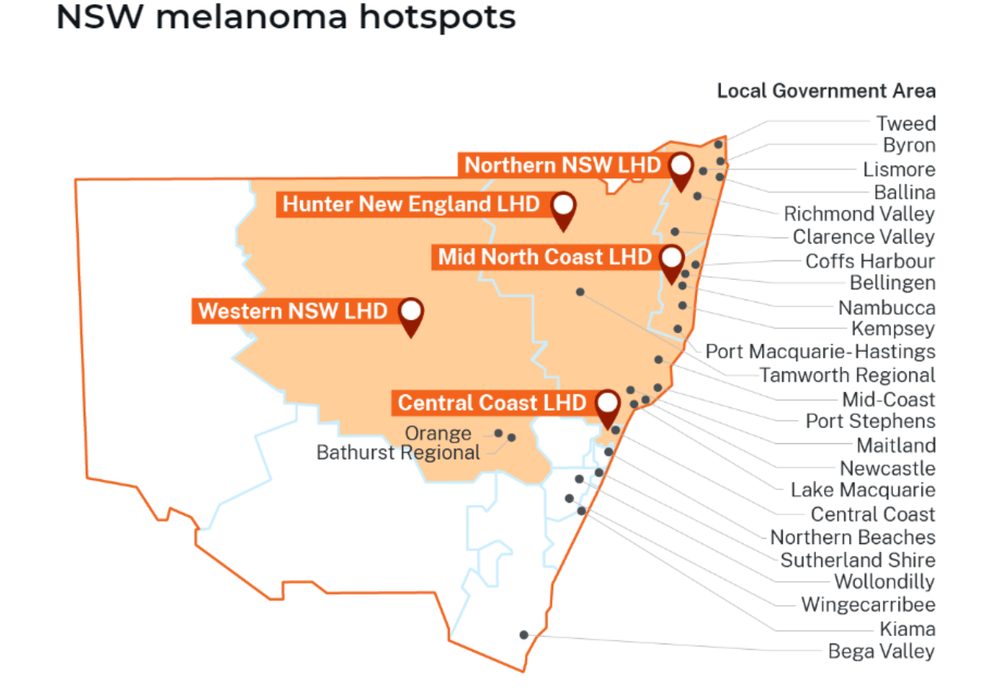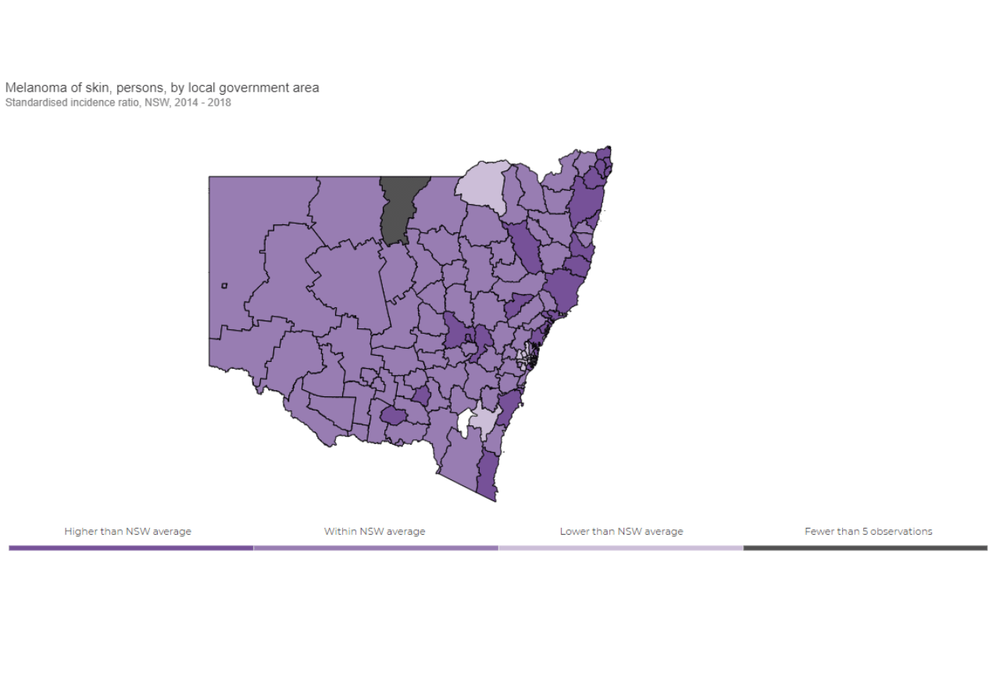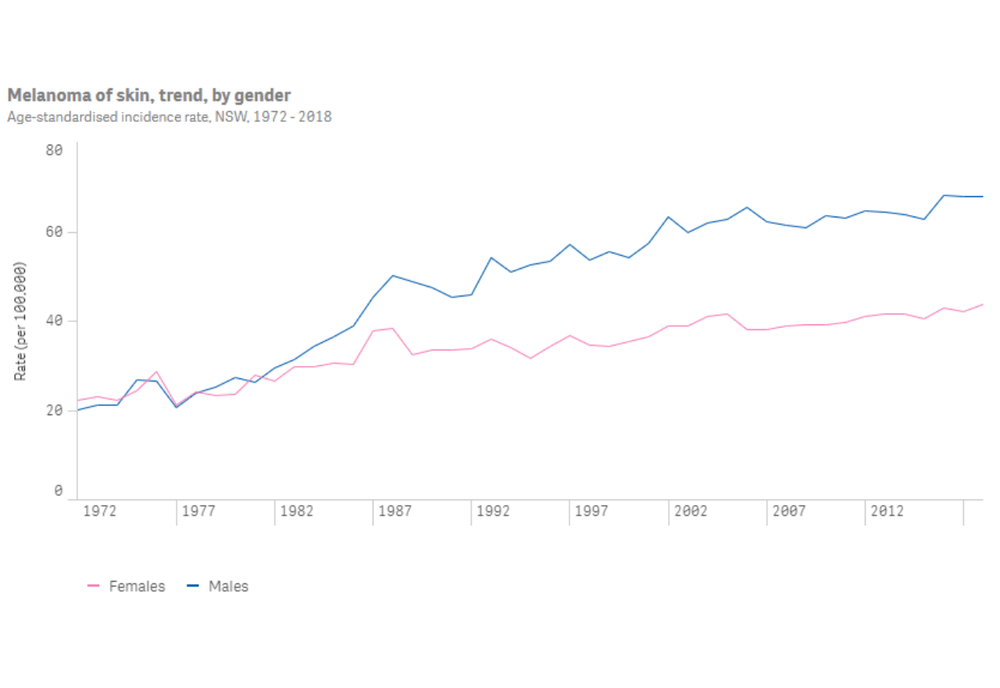How to steer clear of Melanoma this summer
Liam Mulhall
01 January 2023, 8:40 PM
 Credit: Daniel Capilla
Credit: Daniel CapillaOur sunburnt country has the highest rate of skin cancer worldwide and 2022 was no exception with an estimated 17,756 cases of melanoma recorded before the year was out.
Males make up the majority of the cases in Australia with 10,734 men diagnosed, and with the summer season now upon us, that number is only going to increase.
So, to help raise awareness about melanoma and sun safety, the Cancer Institute of NSW have released a map of 'melanoma hotpots'.
The map shows the various local government areas (LGAs) throughout NSW and determines whether their melanoma incidence rate is higher or lower than the NSW average - in doing so, visualising which LGAs are deemed a hotspot.
Most of the hotspots are along coastal areas suggesting they're more prone to melanomas than inland LGAs
However, you can see there are a few hotspots scattered randomly in regional and rural NSW that seem to buck an otherwise consistent trend.

Skin Cancer Hotspots throughout NSW. Source: Cancer Institute NSW
It is even more interesting seeing where these melanoma-prone areas are situated in western NSW - the regional centres of Bathurst, Orange and Tamworth.
So what logic is there behind regional centres being more prone to skin cancer than the rural towns that surround them?

Skin Cancer has a higher incidence in the regional centres of Bathurst, Tamworth, Orange, and Wagga Wagga. Source: Cancer Institute NSW
There are a few possible answers.
The President of the Rural Doctor's Association, Dr Megan Belot, says that it could be a case of people not being as willing to get tested.
“Rates are higher in regional, rural and remote areas, and we know that older men are the least likely to protect themselves from the sun, and are also less likely to make a skin check appointment with their doctor, often delaying their diagnosis."
"It is extremely important that diagnosis is made earlier on to increase chances of survival."
Early diagnosis is absolutely vital to give yourself the best chance of survival against skin melanomas.
“Early diagnosis and action on skin cancer is essential. Survival from melanoma is strongly associated with depth of invasion; deeper and thicker melanomas are more likely to metastasise (spread) and be more difficult to treat," said Dr Belot.
“A skin check is the most important cancer screening you can have; skin cancers account for around 80% of all newly diagnosed cancers in Australia."
But in rural Australia, getting that diagnosis can prove to be a tough task, let alone getting an early diagnosis.
So what can you do?
Put simply, rural NSW just doesn’t have the same level of access to services that regional and metropolitan people have.
If you lived in Sydney, you could call up your local specialist and book yourself in for a skin check the very next day.
Out rurally you have to plan out your trips to the specialist because you're facing a waitlist just a little bit longer than a day.
For many Western Plains residents, the local skin specialist is based out of Dubbo - and their next available appointment is not until February!
Even if you wanted to venture down a few more hours to Orange - in mid December their next appointment was not until January 11.

Skin Cancer Incidence has been steadily increasing. Source: Cancer Institute NSW
With that in mind, the best model of practice is creating a habit of intervention and prevention, says Liz King, the Skin Cancer Prevention Unit manager at the Cancer Council.
"Farmers as an industry are usually really good with their PPE, wearing long work clothes and broadbrimmed hats which are great protection from the sun."
"But the best thing to do is create a habit; regularly putting on sunscreen is more effective than getting skin checks whenever you can."
"95% of skin cancers come from UV exposure, so it's really easy to remove almost all the risk of melanoma by engaging in sun-safe behaviours every day."
For those with years of sun exposure Liz King also says that it's never too late to start.
"A lot of melanoma's come from accumulative exposure - where people have had years of exposure to the sun with minimal protection."
"Melanomas will often form after the skin has reached a tipping point, which is why skin cancers are more common in those aged 40 and older."
"So it's never too late to start being sun safe."




